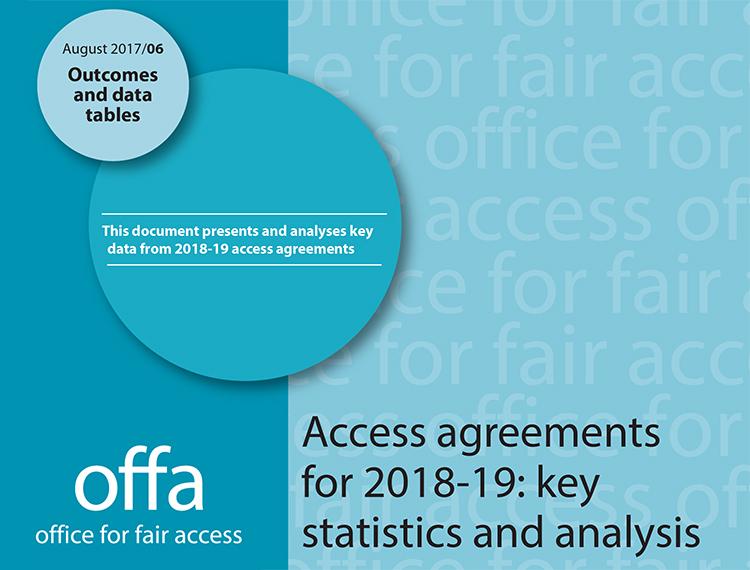Universities and Colleges to help schools support disadvantaged students

All the latest university and college access agreements include plans to work with schools to raise attainment among disadvantaged pupils, supporting them to reach their full potential and overcome any barriers created by their circumstances.
Every university, and many further education colleges, in England have committed to working with schools from 2018-19 to help improve access to higher education, the Office for Fair Access (OFFA) announces today in its annual summary of key points from institutions’ access agreements (OFFA publication 2017/06, Access agreements for 2018-19: key statistics and analysis).
The plans represent a combination of new activities and scaling up/re-focusing of existing work and include:
- sponsoring schools
- establishing free schools and University Technical Colleges
- involvement with curriculum design
- sharing resources
- help with governance, management and advice
- long-term outreach work such as mentoring and tutoring programmes
- training classroom teachers and school managers
- partnerships with third-sector organisations such as charities.
Recognising the important role that the higher education sector can play in raising attainment in schools, OFFA made working with schools to raise attainment for disadvantaged pupils a requirement in its guidance for access agreement approval this year for the first time. However, many universities and colleges have voluntarily been engaging in attainment-raising activity for a number of years.
The implementation of this work will be monitored annually, expect to see it developed further in future years.
Responding to OFFA’s annual summary of institutions’ access agreements,
 Alistair Jarvis, Chief Executive of Universities UK, said:
Alistair Jarvis, Chief Executive of Universities UK, said:
“The enhancements in the support provided by universities has helped to increase the entry rate for disadvantaged young people to record levels. All UK universities are working hard to widen participation and support disadvantaged students throughout their time at university.
“It is right to expect a continued focus on support for disadvantaged students to make further progress in closing the gap between different student groups. Universities are working to better identify what support has the most impact and ensure that interventions are built on a strong evidence-based approach to boost social mobility.
“Universities already engage with schools in a range of ways and universities will continue to extend this activity to raise attainment and help young people reach their full potential.”
Professor Les Ebdon, Director of Fair Access to Higher Education, said:
“Universities and colleges often tell me that they cannot improve access as fast as they want to, because they do not receive enough applications from young people with the right grades. My response was to challenge them to help fix this.
“I told universities and colleges that they must help schools to address low attainment among disadvantaged pupils, or they would not have their access agreements approved and the level of tuition fees they could charge would be severely limited as a result.
“I am pleased with how well they have responded to my challenge. As a result, all universities and many further education colleges will be getting involved with schools to help young people overcome any barriers of circumstance that they face, and achieve to their full potential. That means many more bright and talented teenagers will get the exam grades they deserve and thus be able to apply to higher education if they wish.
“In some cases, mature learners will also be supported so that they can develop their skills.”
Other key developments in 2018-19 access agreements include:
- improved evaluation of the impact of financial support that universities and colleges give to students, such as bursaries and scholarships
- increased activity to improve access for White males from socio-economically disadvantaged backgrounds, who are one of the most under-represented groups in higher education
- greater effort to address the issue of Black and minority ethnic students achieving lower degree grades and employment outcomes than White students despite similar prior attainment
- more support for students with mental health difficulties, specific learning disabilities and/or who are on the autism spectrum
- increased activity to improve access among mature and part-time learners, following a large drop in numbers of these students in recent years
- a more evidence-based approach to developing activities and targeting expenditure
- access activities that complement the National Collaborative Outreach Programme and Opportunity Areas (regions of England identified by the Department for Education as the most challenged in terms of social mobility).

Responses